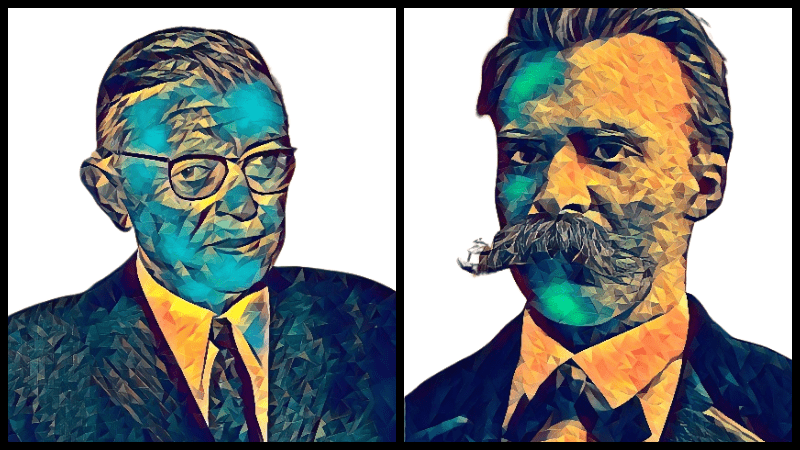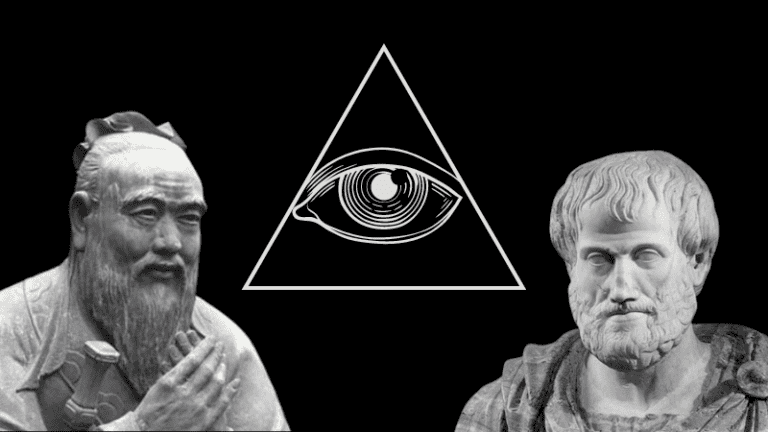The differences between existentialism and nihilism
Existentialism and nihilism are two of the most popular philosophical movements of the 20th century. Although they are related, there are crucial differences between them. In this blog post, we'll explore those differences and try to figure out which of the two is more appealing to you. We'll also take a look at the future of these philosophies and see what lies ahead.
This post has a new formatting style that we are testing. The idea is to make the information more accessible to you. Feel free to give us feedback. We would appreciate it.
Existentialism
There are many questions about existentialism. We have selected the most common ones for you:
What is the definition of existentialism?
Existentialism is a philosophical and psychological movement that emphasizes the existence of the individual self and the subjective experience of life. It emphasizes the unique experience of the individual rather than the universal experience.
When did the philosophical movement of existentialism begin?
The existentialist movement began in the 1940s. At least Jean-Paul Sartre, the most famous existentialist, defined the term. However, the early existentialists (although they were not called that at the time) were philosophers like Friedrich Nietzsche and Søren Kierkegaard, who wrote in the late 1800s.
What are some of the most important existentialist beliefs?
Existentialists believe that man creates his own meaning in life. This is because for existentialists there is no inherent meaning in life.
Who are the key figures of existentialism?
Jean-Paul Sartre is the most famous existentialist. Other key figures associated with existentialism are Friedrich Nietzsche, Martin Heidegger, and Karl Jaspers.
Do you want to understand Nietzsche's thinking better? Then here you have a sample article: Nietzsche on the power to build your own heaven
Where did existentialism begin?
Existentialism began in Europe, especially in France and Germany.
Why did existentialism come about?
Existentialism arose because people were tired of traditional philosophical currents such as empiricism and rationalism. Especially after the Second World War. They wanted something new that would deal with the problems of the modern world.
If you want to know in more detail, how existentialism came into beingHere you can find a complete article.
What are the key ideas associated with this?
- Freedom
- Choice
- Responsibility
- Insignificance
- Fear
- existential crisis
Nihilism
Just as with existentialism, there are many questions about nihilism. We have selected the most frequent ones for you:
What is the definition of nihilism?
Nihilism is a philosophical movement that emphasizes the meaninglessness of life. It is the belief that nothing in life has any inherent meaning or value. This can lead to a sense of despair and hopelessness.
When did the philosophical movement of nihilism begin?
The nihilist movement began in the late 19th century. It was a time when people questioned the existing order and sought new ways of living.
Who are some of the key figures associated with nihilism?
Friedrich Nietzsche is the most famous nihilist. Other important figures associated with nihilism are Arthur Schopenhauer and Ivan Turgenev.
Where did nihilism begin?
Nihilism began in Europe. The philosophy first emerged in Germany and Russia through the works of Nietzsche and Turgenev, respectively.
Why did nihilism become a thing?
Nihilism arose because people were tired of traditional philosophical movements like existentialism and rationalism. They wanted something new that would deal with the problems of the modern world. Nietzsche and Turgenev were two of the first to advocate this new way of thinking, as both criticized the established order in their works.
What are the key ideas associated with this?
- Insignificance
- Void
- Despair
- Loneliness
- Meaninglessness
- Meaninglessness
Are nihilists atheists?
Most nihilists are atheists, but not all of them. Some nihilists believe in a God, but they do not believe that this God has any inherent meaning or value. Nietzsche, for example, was an atheist.
You are interested in this topic? Here is another existentialism article: Søren Kierkegaard: Why You Must Be Yourself
Similarities and differences
Existentialists believe that we must create our own meaning in life, while nihilists believe that all meaning is created by society and therefore does not exist. Existentialists also focus on individual experience, while nihilists focus on collective experience. Both philosophies have their advantages and disadvantages, but which one is more appealing to you?
Existentialists focus on individual experience VS. Nihilists focus on the collective experience
On the one hand, existentialists believe that we must create our own meaning in life. This can be seen as a good thing because it allows creativity and growth. It also means that we are responsible for our own actions and choices.
On the other hand, nihilists believe that all meaning is created by society and therefore does not exist. This can be considered bad because it can lead to a sense of hopelessness and despair. It also means that we are not responsible for our own actions and choices.
Pros of Existentialism:
– Creativity: Existentialists believe that we must create our own meaning in life, which allows for creativity and growth.
- Responsibility: existentialists also focus on individual experience, which means that we are responsible for our own actions and choices.
– Growth: Existentialists believe that we must create our own meaning in life, which enables us to grow. So growth is something compelling.
Counterarguments to Existentialism:
– Despair: Existentialists believe that we must create our own meaning in life, which can lead to a sense of despair when we are unable to do so.
– Hopelessness: Existentialists believe that we must create our own meaning in life, which can lead to a sense of hopelessness when we are unable to do so.
– Loneliness: Existentialists focus on individual experience, which can lead to feelings of loneliness.
Pros of Nihilism:
– Freedom from responsibility: Nihilists believe that all meaning is created by society and therefore we are not responsible for our own actions and choices.
– No need to create meaning: Nihilists believe that all meaning is created by society and therefore we do not need to create our own meaning in life as in existentialism. But when you are freed from creating meaning, you can also feel insignificant.
– Focus on the collective experience: Nihilists focus on the collective experience, which can lead to a sense of belonging and community.
– Relief from existential angst: Nihilists believe that all meaning is created by society, which can lead to relief from existential angst because one does not have to worry about one's own individual meaning.
Opponents of Nihilism:
– Futility: Nihilists believe that all meaning is created by society, and therefore it can lead to a sense of meaninglessness in life.
– Usefulness: Nihilists believe that all meaning is created by society and therefore can lead to a sense of meaninglessness in life.
– Insignificance: Nihilists believe that all meaning is created by society and therefore we can feel insignificant as individuals.
– Collectivism: Nihilists focus on the collective experience, which can lead to a loss of individuality.
Which one is better for you?
If you are looking for the meaning of your life (and we are only comparing these two philosophical schools, leaving all others aside), existentialism might be a good fit for you. This philosophy emphasizes the importance of finding your own meaning, and it can help you find the meaning of your life. However, if you struggle with depression or anxiety, nihilism may be a better fit for you. This philosophy emphasizes the emptiness of life and can help you cope with your problems.
Whichever philosophy you choose, it is important to remember that both have their advantages and disadvantages. It's up to you to decide which one appeals to you more and which one will help you live a better life. Thank you for reading and I hope this blog post has helped you understand the main differences between existentialism and nihilism.
We hope you enjoyed the article and found the information you were looking for. We've experimented with a new style of formatting (more FAQ-like) to make it easier for you to access information. Please let us know if you like this style better than the classic continuous text pattern.
Oh, and here are some resources if you want to learn more about existentialism:
More resources on the topic
If you are interested in exploring existentialism further, the following three books are a good place to start.
These books provide an introduction to existentialism by explaining its history and major concepts.
Another useful source is an article on the website Stanford Encyclopedia of Philosophy. Yes, really: a university project. The linked articles is a challenging but interesting read.
If you're looking for an online course, you should find something on udemy.com find
However, we have found that there are great resources on YouTube as well. One of the best summaries is this one:







